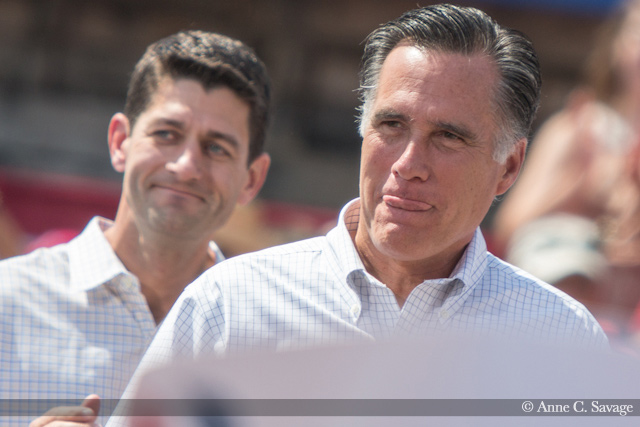
It must be nice to know that you stand to inherit some Mitt Romney money.
Sure, you’re already benefiting from a tsunami of advantages, including the spoils of your father’s political connections. But nothing beats winning destiny’s lottery and knowing that you’re skirting all sorts of tax obligations along the way.
But great as it is to be a direct heir of Mitt, his legacy will extend far beyond his family.
Mitt has given us all a tremendous gift by not giving us something — his complete tax returns. The fact that he’s only the second presidential candidate in the last three decades to not release them — the first was fellow Republican multimillionaire John McCain — makes them all more valuable as symbol.
Now when President Obama proposes ending an array of tax breaks for high earners and their heirs, it isn’t a vague proposition. We see Mitt Romney who amassed a great fortune, often by chewing up companies and spitting them out, paying lower tax rates for collecting checks than some pay for collecting bedpans.
It will also be great context when his old running mate Paul Ryan continues to propose cutting Mitt’s taxes during the next Congress.
Mitt still pays a lower rate than most plumbers, even though his prize for coming in second place in the 2012 election was a slightly higher tax rate in 2013 and new taxes on his investment income to pay for Affordable Care Act in 2014. No wonder he’s bitter.
“Under President Obama, the rich have gotten richer, income inequality has gotten worse and there are more people in poverty than ever before,” Romney said Friday, at a meeting of Republicans who hope he doesn’t run for president.
Like Jeb Bush, Carly Fiorina and even John Boehner, Republicans have realized that the best job creation in the century has cornered them into talking about the real economic crisis of our time: wage stagnation in an era of record corporate profits.
The Daily Beast‘s Michael Tomasky puts the problem in a nutshell:
Since 1979, American workers’ productivity has increased by 80 percent. The income of the top 1 percent has increased 240 percent. And the average American wage, adjusted for inflation, has gone up just a few percentage points, maybe 8 percent. It wasn’t always this way, and it isn’t nearly this bad in other advanced countries. The median wage in the United States today is around $50,000. If wages had kept pace with productivity gains, the median wage would be more than $90,000.
You’ll remember the issue of “income inequality” first became a national issue in 2011 during the second in the trilogy of Mitt Romney’s failed runs for the White House.
Mitt said it should be spoken about “in quiet rooms” — likely in that secret quiet room where he keeps his tax returns — not in public where the middle class might realize that trillions of wealth have been transferred to the people who need it least.
Low wages in the face of record profits would hardly be a crisis to a movement that refuses to raise the minimum wage. But they have to find some fault with the Obama economy — which has created more net jobs in 6 years than were created under 12 years of two Bushes. Thus they’re stuck with the wealth gap, which a is the result of government policies that began in 1981 when the conservative movement got its first chance to prove that making the rich richer would benefit everyone.
Trickle-down economics half worked. The richest have never been richer, especially after a financial crisis abetted by conservative policies, that wiped out a massive chunk of the middle class’ real estate wealth. But workers are struggling in a way they haven’t since before outrageous reforms like weekends, 8-hour work days, and child labor laws.
A new report from the Center for American Progress Report looks at the wage crisis and comes up with clear recommendations that can be summed up in one sentence: Reverse trickle-down economics.
That means a fairer tax code where people are encouraged to work as much as they are to invest. It means an end to corporate governance with no accountability to workers.
It also means ending the “poison pills” of Reaganomics — rarely discussed changes to regulations that turned corporations into “trickle-down” machines where everything is geared to compensate the executives and the investors at the expense long-term growth and workers.
It’s a system that makes Mitt Romneys rich as the middle class dies. Mitt complaining about income inequality is like Justin Bieber complaining about young girls having terrible taste in music. It’s what made him who he is.
Let’s be fair. Mitt has done a lot to help poor people. For instance, he lost in 2012.
Because of that millions of Americans who earn too much for Medicaid gained health insurance coverage at little or no cost through Obamacare. He could help the poor again by losing in 2016 as we elect a president and a Congress that would end his tax breaks.
But until then, Mitt’s tax returns are all we’ve got.
We should ask him about them whenever we get a chance. It will remind us that we need a tax code that taxes the rich fairly enough that they wouldn’t mind admitting what they pay in public.
[Image by Anne Savage.]



